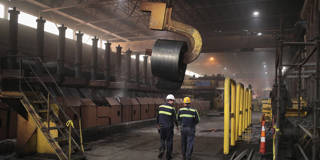US President Joe Biden has established three key economic-policy objectives: increasing the number of “good jobs”; strengthening US manufacturing and local production; and accelerating the adoption of modern technology. Nippon Steel's acquisition of US Steel would advance all three, so why has it aroused bipartisan opposition?
WASHINGTON, DC – Late last year, Japan’s Nippon Steel announced that it had reached a deal to acquire US Steel Corporation for $14.1 billion – a move that would make it the world’s second-largest steel producer by capacity. Nippon Steel agreed to retain US Steel’s name, keep its corporate headquarters in Pittsburgh, Pennsylvania, honor all contracts with union-represented workers, and preserve its manufacturing facilities, which will get a technological upgrade to raise productivity closer to Japanese levels. And Nippon Steel has pledged not to move existing production facilities or jobs overseas. It is a good deal.
The announcement, however, was met with a powerful bipartisan political backlash. Republican Senator J.D. Vance said the deal amounted to “auctioning off” a “critical piece of America’s defense industrial base” to foreigners “for cash.” Democratic Senator Joe Manchin called it a “direct threat” to US national security. Democratic Senator Sherrod Brown urged US President Joe Biden to “explore all options to protect the American steel industry, American steelworkers, and our national and economic security.”
The White House has now called for “serious scrutiny” of the deal, which will include a review by the US Committee on Foreign Investment in the United States (CFIUS) to determine whether it is compatible with US security interests. The United Steelworkers union has also come out against the acquisition.

WASHINGTON, DC – Late last year, Japan’s Nippon Steel announced that it had reached a deal to acquire US Steel Corporation for $14.1 billion – a move that would make it the world’s second-largest steel producer by capacity. Nippon Steel agreed to retain US Steel’s name, keep its corporate headquarters in Pittsburgh, Pennsylvania, honor all contracts with union-represented workers, and preserve its manufacturing facilities, which will get a technological upgrade to raise productivity closer to Japanese levels. And Nippon Steel has pledged not to move existing production facilities or jobs overseas. It is a good deal.
The announcement, however, was met with a powerful bipartisan political backlash. Republican Senator J.D. Vance said the deal amounted to “auctioning off” a “critical piece of America’s defense industrial base” to foreigners “for cash.” Democratic Senator Joe Manchin called it a “direct threat” to US national security. Democratic Senator Sherrod Brown urged US President Joe Biden to “explore all options to protect the American steel industry, American steelworkers, and our national and economic security.”
The White House has now called for “serious scrutiny” of the deal, which will include a review by the US Committee on Foreign Investment in the United States (CFIUS) to determine whether it is compatible with US security interests. The United Steelworkers union has also come out against the acquisition.